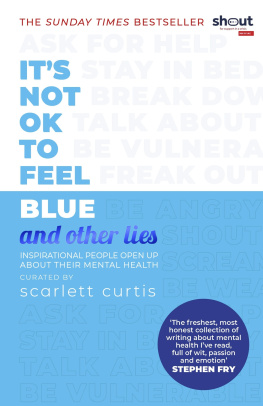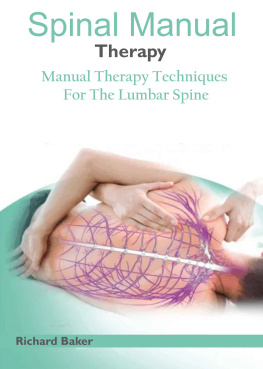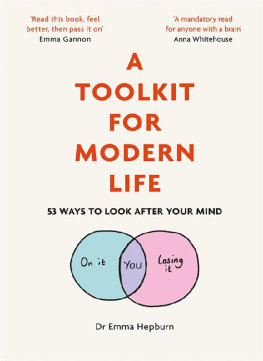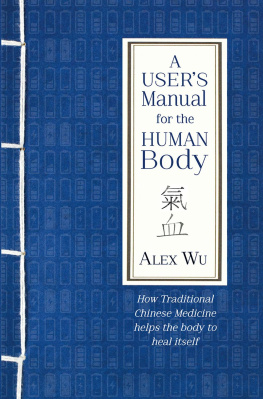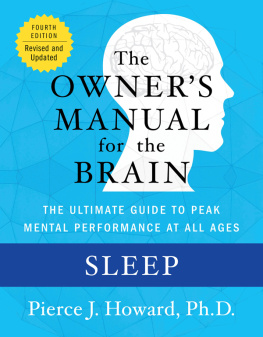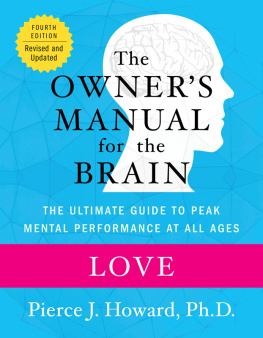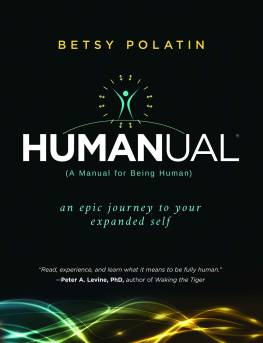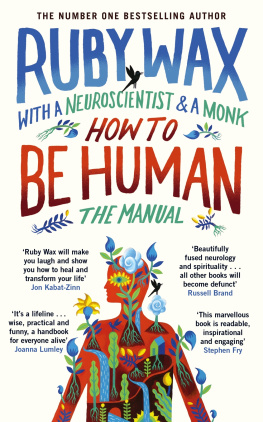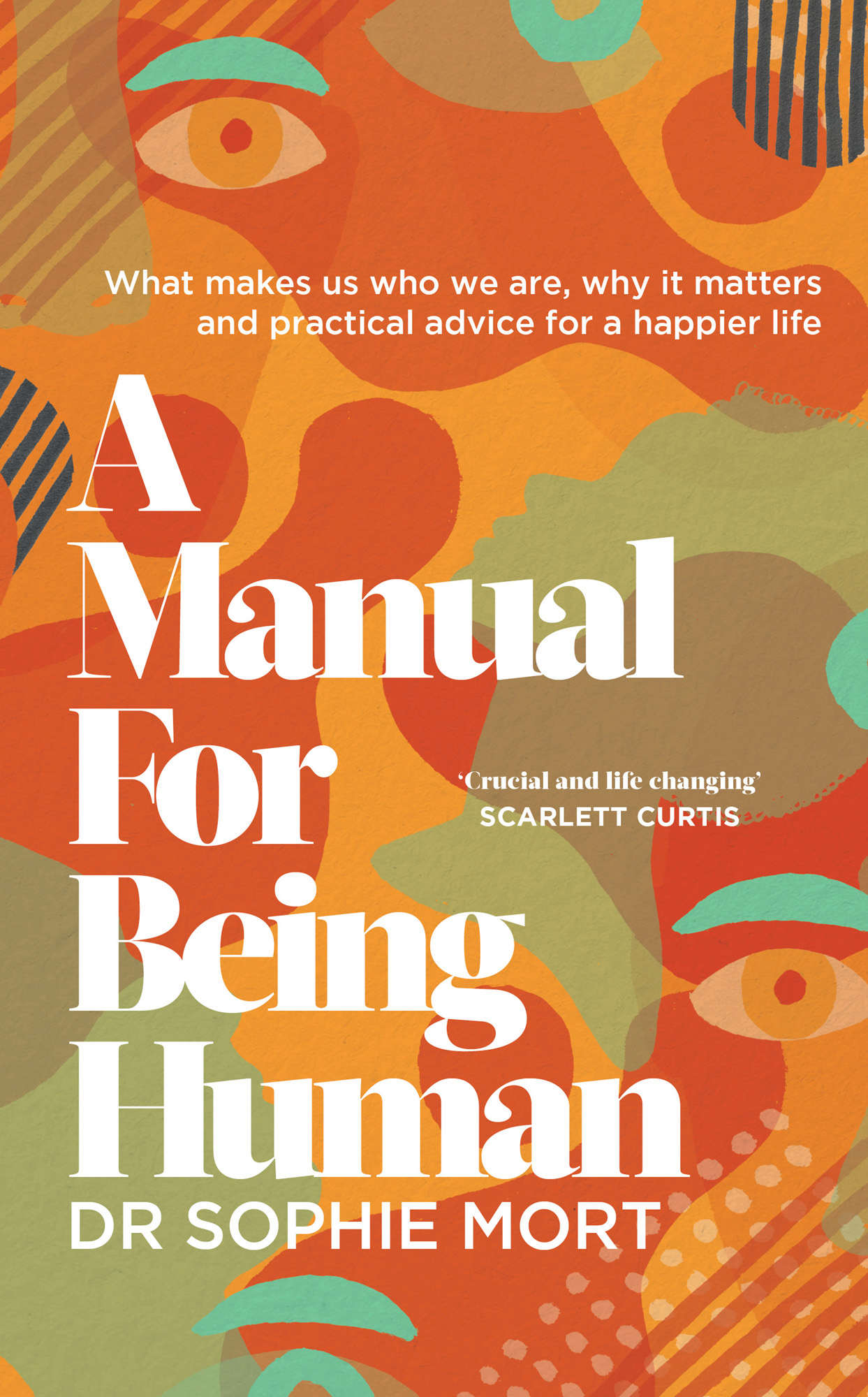Contents
Guide
What makes us who we are, why it matters and practical advice for a happier life
A Manual for Being Human
Dr Sophie Mort
Crucial and life ChangingScarlett Curtis
Praise for A Manual for Being Human
Finally! A book which takes psychological wellbeing across the lifespan out of the therapy room and into the mainstream. Dr Sophs warm, reassuring and frank style will have you understanding yourself, your actions and your relationships without a hefty therapy price tag.
Dr Karen Gurney, author of Mind the Gap
Dr Soph breaks down therapy in a way we can consume and learn from. A powerful voice for people to learn about their mental health I wish Id had this book years ago!
Poppy Jamie, author of Happy Not Perfect
Dr Soph is the therapist and best friend that the world deserves. The world of therapy and professional help is still so inaccessible to so many people and this book is a crucial and life changing one that should be placed in everyones mental health toolkit. A Manual for Being Human is an amazing read and a gift to the world. I cant wait to give it to every single person I know!
Scarlett Curtis, Sunday Times bestselling author of Feminists Don't Wear Pink (and other lies)
A truly wonderful, warm and wise one-stop shop for any inquisitive human. Packed full of prompts, practical tips and pep talks that will guide you through any situation.
Emma Gannon, Sunday Times Business bestselling author of The Multi-Hyphen Method
Absolutely brilliant. A gold mine of coping skills to get us through life. I will be keeping copies in my therapy room and my own home. Do not skip this one.
Dr Julie Smith, clinical psychologist
Through her book, Dr Soph manages to not only help us understand ourselves better but shares the therapeutic tools we can put in place to make life a little easier too. Insightful and robust and yet also, warm and personal, this book will stay with me for years.
Lucy Sheridan, author of The Comparison Cure
Psychology at its most accessible and usable! Sophie takes us on a journey through our lives to make sense of how we think, feel and behave then helps us build a strong path to go forward and live our future lives well.
Dr Emma Hepburn, author of A Toolkit for Modern Life: 53 Ways to Look After Your Mind
This book is for the human-curious, psychology-curious and therapy-curious it is for humans unable to access therapy and also those who are paying for long-term support.
I wrote this for people who are looking for an answer to how they are feeling. For those who are interested in understanding themselves more fully and for those who are hurting and have no place to turn to make sense of their experience. I am writing it for the thousands of people who speak to me each day on Instagram, the brave souls that reach across the electronic divide sharing how lost they feel, at sea without a framework to underpin and explain their experience.
What caused people distress was not so much their own mistakes, inadequacies and illnesses as the powers and influences that bore down upon themfrom the world beyond their skin.
DAVID SMAIL
Introduction: Why People Are Struggling
Hi, Im Dr Soph.
You can call me Soph or Sophie.
Im a clinical psychologist.
A few years ago, I was working in a London hospital, in a brain injury outreach team for adults. One day I was driving away from an appointment with a new patient and I realised something. I realised that over the previous eight years, across all the services I had worked in, I had witnessed the same thing in all of my new patients: people in extreme distress who had sat on a waiting list for a long time (sometimes for over a year) and had never been given the fundamental psychological ideas that are considered common and obvious among psychologists.
I realised I was spending the first few sessions with every person I saw destigmatising their experiences and giving them the same basic information.
If this information had been accessible much earlier on, it would have eased some of their anxiety and pain while they were on the waiting list.
I thought about what Id heard on the news that morning about rising numbers of people seeking help, the overwhelmed mental health services trying to manage, and concerns that the mental health of the population of the UK, and the world as a whole, was in decline.
I also thought about the questions I was hearing among my friends, my family and the people who contact me each day on Instagram: Why do I feel so bad? How did I get here? How do I move forward? Who should I listen to? How can I afford to help myself when therapy and other forms of support are so expensive? I too have asked these questions. Thats actually why I trained as a psychologist.
And then I suddenly understood.
There is a damn good reason why people are struggling. We are not raised to understand ourselves.
We are not taught to understand our emotions or who we are at a young age. Instead, we are raised to fear them and experience shame whenever any kind of distress arises. Rather than being taught simple and effective coping strategies, we are usually taught to put on a brave face; told to be good, snap out of it, or that its no big deal.
Instead of being encouraged to embrace all of who we are, including imperfections and weaknesses, we are expected to create a personal brand to show to the outside world at all times. We hide how we truly feel, even from ourselves.
This means we are totally ill equipped to manage the stresses of life and what it means to live inside our emotion-filled bodies.
Without knowing how to understand ourselves, the odds are stacked against us. When distress inevitably comes knocking at our door we have no useful ways to respond. We pretend everything is fine. We keep busy, burying ourselves in work. We use sex, alcohol, drugs or Netflix as fun but temporary distractions. Distractions that dont solve the problems or help us move forward. Distractions that just delay the inevitable for a little while, until the next wave of distress hits.
We then blame ourselves for the way we feel, which makes us feel worse, and the cycle continues.
I think we have been set up to struggle.
Well, not anymore! On that day of realisation, I pulled my car into a layby, grabbed a pen from my bag and wrote a list of all the things Id cover off in most initial sessions with clients. This book is the result of those notes and the answer to the questions I hear every day.
Im going to share with you the information usually kept behind therapy room doors, in the ivory towers of academic buildings and in dusty old textbooks.
If you have ever asked the same questions my clients, friends, family and I have asked, this book will help you answer them and will give you the information you need to understand the very core of who you are and how you came to be, well you.
What you will find in this book
This book is a manual for the human experience. It is not a dry and dull psychology compendium (dont worry, I read those for you). Its a book filled with psychological ideas from a mix of traditions, including my own theories and tips that you can put to use immediately. It starts with our earliest experiences and moves through to adult life.


